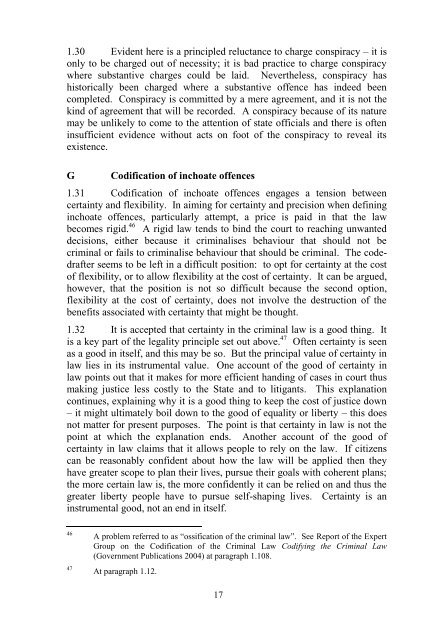Consultation Paper on Inchoate Offences - Law Reform Commission
Consultation Paper on Inchoate Offences - Law Reform Commission
Consultation Paper on Inchoate Offences - Law Reform Commission
Create successful ePaper yourself
Turn your PDF publications into a flip-book with our unique Google optimized e-Paper software.
1.30 Evident here is a principled reluctance to charge c<strong>on</strong>spiracy – it is<strong>on</strong>ly to be charged out of necessity; it is bad practice to charge c<strong>on</strong>spiracywhere substantive charges could be laid. Nevertheless, c<strong>on</strong>spiracy hashistorically been charged where a substantive offence has indeed beencompleted. C<strong>on</strong>spiracy is committed by a mere agreement, and it is not thekind of agreement that will be recorded. A c<strong>on</strong>spiracy because of its naturemay be unlikely to come to the attenti<strong>on</strong> of state officials and there is ofteninsufficient evidence without acts <strong>on</strong> foot of the c<strong>on</strong>spiracy to reveal itsexistence.GCodificati<strong>on</strong> of inchoate offences1.31 Codificati<strong>on</strong> of inchoate offences engages a tensi<strong>on</strong> betweencertainty and flexibility. In aiming for certainty and precisi<strong>on</strong> when defininginchoate offences, particularly attempt, a price is paid in that the lawbecomes rigid. 46 A rigid law tends to bind the court to reaching unwanteddecisi<strong>on</strong>s, either because it criminalises behaviour that should not becriminal or fails to criminalise behaviour that should be criminal. The codedrafterseems to be left in a difficult positi<strong>on</strong>: to opt for certainty at the costof flexibility, or to allow flexibility at the cost of certainty. It can be argued,however, that the positi<strong>on</strong> is not so difficult because the sec<strong>on</strong>d opti<strong>on</strong>,flexibility at the cost of certainty, does not involve the destructi<strong>on</strong> of thebenefits associated with certainty that might be thought.1.32 It is accepted that certainty in the criminal law is a good thing. Itis a key part of the legality principle set out above. 47 Often certainty is seenas a good in itself, and this may be so. But the principal value of certainty inlaw lies in its instrumental value. One account of the good of certainty inlaw points out that it makes for more efficient handing of cases in court thusmaking justice less costly to the State and to litigants. This explanati<strong>on</strong>c<strong>on</strong>tinues, explaining why it is a good thing to keep the cost of justice down– it might ultimately boil down to the good of equality or liberty – this doesnot matter for present purposes. The point is that certainty in law is not thepoint at which the explanati<strong>on</strong> ends. Another account of the good ofcertainty in law claims that it allows people to rely <strong>on</strong> the law. If citizenscan be reas<strong>on</strong>ably c<strong>on</strong>fident about how the law will be applied then theyhave greater scope to plan their lives, pursue their goals with coherent plans;the more certain law is, the more c<strong>on</strong>fidently it can be relied <strong>on</strong> and thus thegreater liberty people have to pursue self-shaping lives. Certainty is aninstrumental good, not an end in itself.4647A problem referred to as “ossificati<strong>on</strong> of the criminal law”. See Report of the ExpertGroup <strong>on</strong> the Codificati<strong>on</strong> of the Criminal <strong>Law</strong> Codifying the Criminal <strong>Law</strong>(Government Publicati<strong>on</strong>s 2004) at paragraph 1.108.At paragraph 1.12.17
















